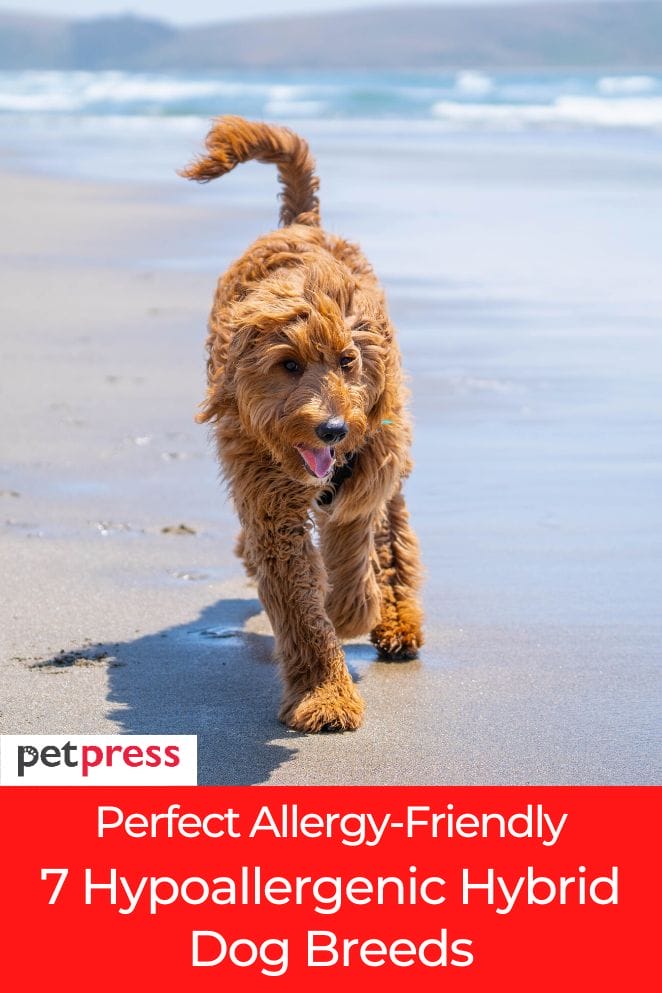
Are you looking for a furry friend that won’t trigger your allergies?
You’re in luck! Hypoallergenic hybrid dog breeds are becoming increasingly popular among pet owners who suffer from allergies.
These breeds are created by crossing two purebred dogs, resulting in a mix with specific traits from both parents.
In this blog post, we’ll explore some of the most popular hypoallergenic hybrid breeds, their benefits, and considerations when choosing one for your family.
Popular Hypoallergenic Hybrid Breeds
Hybrid dog breeds, specifically those designed to be hypoallergenic, have gained significant popularity in recent years.
These breeds combine the best traits of two different purebred dogs, often resulting in adorable and intelligent companions.
Let’s delve into the details of some of these popular hypoallergenic hybrid breeds:
Goldendoodle

The Goldendoodle, a cross between a Golden Retriever and a Poodle, has won hearts with its friendly and playful nature.
Available in three sizes – miniature, medium, and standard – these dogs are well-suited for families of all sizes.
What makes Goldendoodles particularly appealing to allergy sufferers is their low-to-shedding coats, reducing the risk of triggering allergies.
Breed overview
| Temperament | Friendly, Playful |
| Coat Characteristics | Low to non-shedding |
| Grooming Requirements | Regular grooming, especially for longer coats |
Labradoodle
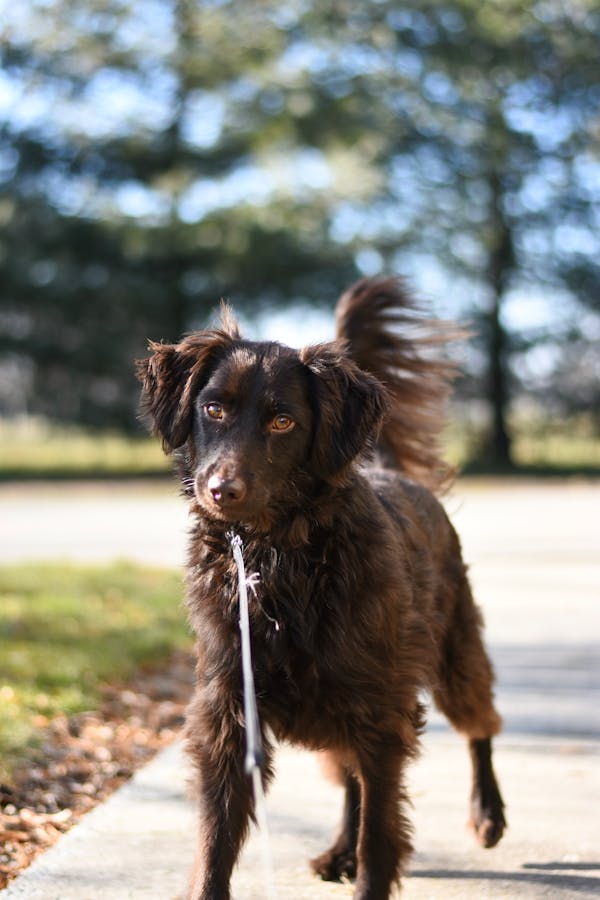
A Labradoodle, born from the mix of a Labrador Retriever and a Poodle, is renowned for its intelligence, loyalty, and compatibility with children.
With coats ranging from curly to wavy, Labradoodles demands regular grooming to maintain their charm.
These dogs are not only hypoallergenic but also make excellent family pets due to their gentle demeanor.
Breed overview
| Temperament | Intelligent, Loyal, Great with Children |
| Coat Characteristics | Curly to wavy |
| Grooming Requirements | Regular grooming to prevent matting and tangling |
Schnoodle

Combining the Schnauzer and Poodle genes, the Schnoodle is a small and adorable breed with a low-to-shedding coat.
Known for their high intelligence and trainability, Schnoodles make great companions for families looking for a hypoallergenic and easily manageable pet.
Breed overview
| Temperament | Highly Intelligent, Easy to Train |
| Coat Characteristics | Low to non-shedding |
| Grooming Requirements | Regular grooming for their distinctive coat |
Shih-Poo
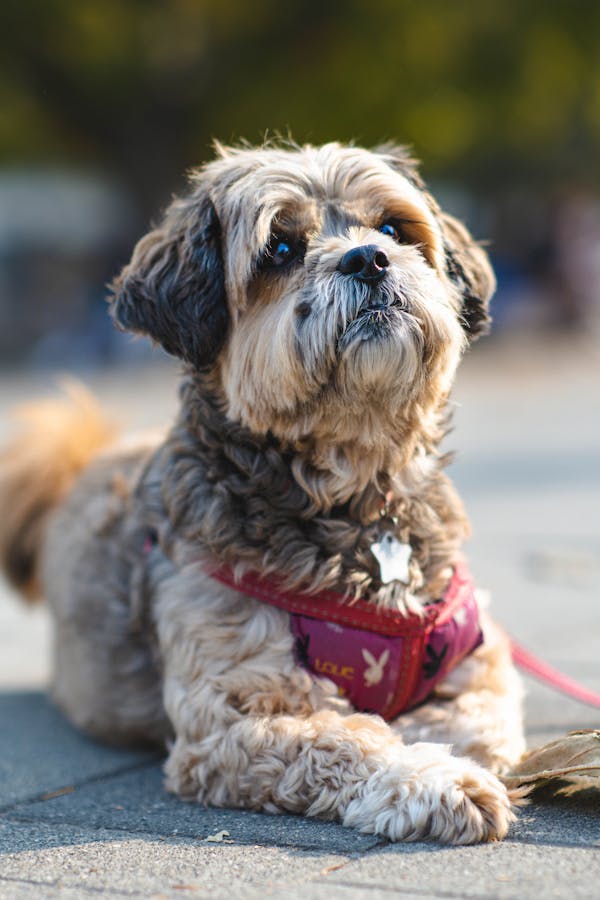
The Shih-Poo, a delightful mix of a Shih Tzu and a Poodle, stands out with its small size, cuteness, and hypoallergenic coat.
Highly intelligent and trainable, these dogs are a favorite choice for those seeking a low-maintenance and allergy-friendly pet.
Breed overview
| Temperament | Highly Intelligent, Easy to Train |
| Coat Characteristics | Low to non-shedding |
| Grooming Requirements | Regular grooming, especially for facial hair |
Maltipoo
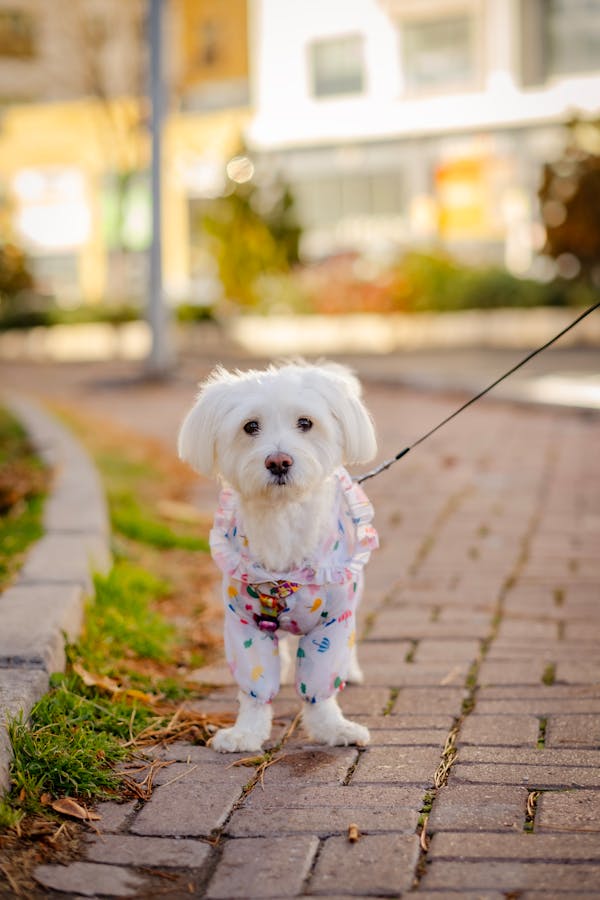
A crossbreed of a Maltese and a Poodle, the Maltipoo is a small, intelligent, and easy-to-train companion.
Their low to non-shedding coat, coupled with their affectionate nature, makes them a popular choice for families and individuals with allergies.
Breed overview
| Temperament | Highly Intelligent, Easy to Train |
| Coat Characteristics | Low to non-shedding |
| Grooming Requirements | Regular grooming, particularly for longer coats |
Cavachon
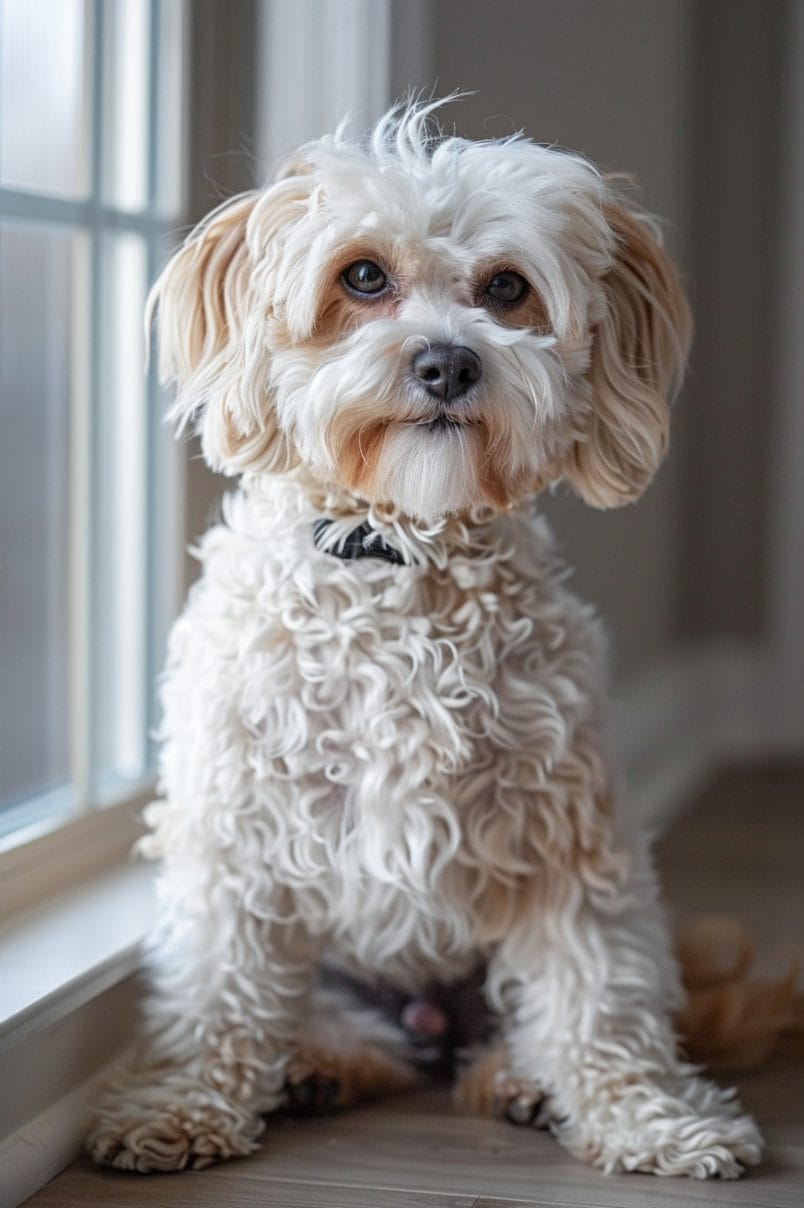
The Cavachon, blending the traits of a Cavalier King Charles Spaniel and a Bichon Frise, is a small and adorable hypoallergenic breed.
With a low to non-shedding coat and a reputation for intelligence and ease of training, Cavachons make for delightful family pets.
Breed overview
| Temperament | Highly Intelligent, Easy to Train |
| Coat Characteristics | Low to non-shedding |
| Grooming Requirements | Regular grooming to maintain their coat |
Yorkipoo

The Yorkipoo, a mix of a Yorkshire Terrier and a Poodle, is a petite and charming breed with a hypoallergenic coat.
Recognized for their intelligence and trainability, Yorkipoos are well-suited for families and individuals seeking a small, low-maintenance pet.
Breed overview
| Temperament |
Highly Intelligent, Easy to Train
|
| Coat Characteristics |
Low to non-shedding
|
| Grooming Requirements |
Regular grooming for their fine, silky hair
|
Benefits of Hypoallergenic Hybrid Breeds
Hypoallergenic hybrid breeds offer a range of advantages that make them an excellent choice for various households.
Let’s explore these benefits in detail:
Low to non-shedding coats
One standout feature of hypoallergenic hybrid breeds is their coats, which shed significantly less compared to traditional dog breeds.
This characteristic is a game-changer for allergy sufferers.
The reduced shedding minimizes the presence of pet dander in the home, a common trigger for allergies.
Easy to maintain
These breeds are generally easier to maintain in terms of grooming compared to other dogs.
The low to non-shedding coats mean less loose fur to contend with around the house.
This not only contributes to a cleaner living environment but also translates to fewer grooming sessions.
Intelligent and trainable
Many hypoallergenic hybrid breeds boast high intelligence levels, making them quick learners and easy to train.
This trait is particularly beneficial for families with children or individuals seeking a furry companion that adapts well to commands and routines.
Loyal and friendly
The friendly and playful nature of hypoallergenic hybrid breeds makes them delightful companions for people of all ages.
Their loyalty to their owners creates a strong sense of connection and trust.
Whether it’s enjoying playtime with children or providing comfort to individuals, these breeds are known for their affable personalities.

Considerations When Choosing a Hypoallergenic Hybrid
Choosing a hypoallergenic hybrid breed is an exciting venture, but it’s crucial to keep in mind certain considerations to ensure a harmonious match between you and your furry companion.
Here are some key factors to ponder:
No guarantee
While hypoallergenic hybrid breeds are generally touted as being less likely to cause allergies, it’s essential to acknowledge that there’s no absolute guarantee.
Shedding and allergen levels can differ even within the same breed.
To make an informed decision, spend quality time with the puppy to assess their potential impact on allergies.
Coat type
Hypoallergenic hybrid breeds can exhibit various coat types, including curly, wavy, and straight.
Each coat type comes with its own set of grooming needs.
For instance, curly coats may require more attention to prevent matting, while wavy or straight coats may need less maintenance.
Consider your willingness and ability to meet these grooming requirements when selecting a breed.
Breeder reputation
Selecting a reputable breeder is a critical step in welcoming a hypoallergenic hybrid into your home.
A responsible breeder prioritizes the health and well-being of their dogs, ensuring proper care and breeding practices.
This commitment not only contributes to the overall health of the puppy but also minimizes the risk of allergies.
Mixed temperament
Since hypoallergenic hybrid breeds are a fusion of two purebred dogs, it’s imperative to delve into the temperament of both parent breeds.
This research provides valuable insights into potential behavioral traits and characteristics your new pet may exhibit.
Understanding the parent breeds’ temperaments helps you anticipate your furry friend’s behavior, making the transition into your home smoother.

Conclusion
Hypoallergenic hybrid dog breeds are a great option for allergy sufferers looking for a furry companion.
These breeds have low to non-shedding coats, are easy to maintain, and are highly intelligent and trainable.
However, it’s essential to consider factors like coat type, breeder reputation, and mixed temperament when choosing a hypoallergenic hybrid breed.
Remember, while these breeds are considered less likely to cause allergies, there’s no guarantee, so it’s crucial to spend time with the puppy to assess their potential allergens.
FAQs
A hypoallergenic hybrid dog breed is a mix between two purebred dogs, resulting in a mix with specific traits from both parents. These breeds are known for their low to non-shedding coats, making them ideal for allergy sufferers.
No, while hypoallergenic hybrid breeds are generally considered less likely to cause allergies, there’s no guarantee. Shedding and allergens can vary even within a breed, so it’s crucial to spend time with the puppy to assess their potential allergens.
Some popular hypoallergenic hybrid breeds include the Goldendoodle, Labradoodle, Schnoodle, Shih-Poo, Maltipoo, Cavachon, and Yorkiepoo.
- Does Cat Litter Melt Ice? The Complete Guide to Winter Safety - January 30, 2026
- Happy Tail Dogs: Understanding This Common Canine Condition - January 29, 2026
- How Cold Can Outdoor Cats Handle? Feline Winter Safety - January 27, 2026


GIPHY App Key not set. Please check settings